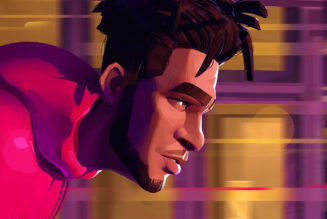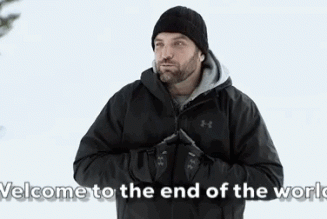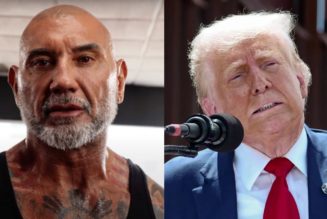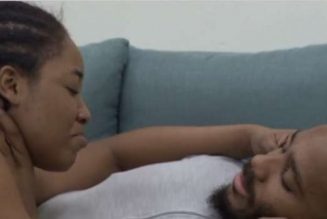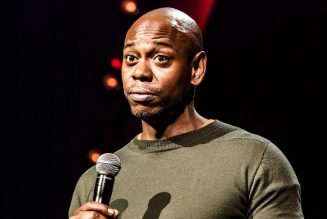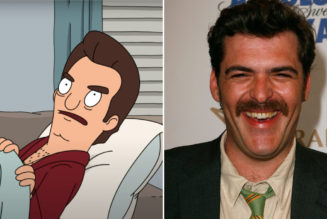When Michael Cimino first saw Love, Simon — Greg Berlanti’s sleeper hit from 2018 about a closeted high schooler (Nick Robinson) coming out to himself, then his classmates, by way of a grand, ferris wheel kiss — he was struck hard. He had recently graduated from high school and moved to Los Angeles from Las Vegas, where he was born and grew up, in pursuit of big-screen goals; and he found himself, like many Hollywood dreamers before him, “so broke. So, we went to see it on a Tuesday, when it was a $5 movie night,” he tells MTV News. “I literally walked out of the theater, and I was with some of my best friends, and I was like, ‘I cannot wait to be in a project like that.’”
It would be a year until the emerging actor, whose résumé up to that point had been dotted by periodic TV cameos and a stint as Flounder in a middle school production of The Little Mermaid, landed a studio gig as the bushy-browed, boy-next-door love interest Bob Palmer in Annabelle Comes Home, the seventh installment of the Conjuring horror franchise. And it would be another year, still, before the debut of his first leading role, in a project strikingly similar to Love, Simon — its spin-off, no less, the Hulu series Love, Victor, set within the same universe but with a cast of young, fresh faces.
Now 20, now vegan, Cimino stars as the title character, Victor Salazar. A transfer student to Creekwood High, where Simon’s legend perseveres even after he’s moved on to college, Victor is initially excited about the opportunity to open up about his sexuality in what seems like a diverse, accepting environment. But that hard-wrought process is soon halted when he unwittingly attracts the coolest girl in school (Rachel Naomi Hilson’s Mia), then made even more complicated by a blossoming crush for his perfectly coiffed, openly gay coffee-shop coworker, Benji (George Sear). The conflict between Victor’s desire to live his truth and his painful, internalized homophobia is further heightened by a fear of rejection from his loving yet religious, Colombian-American family.
 Hulu
HuluCimino, who describes his own family as “stereotypically Puerto Rican,” can relate to Victor’s struggle. “Family is everything in our culture,” he explains. “And I think that’s very, very prevalent in the Latinx community. And that’s why, for some Latinx kids, it’s a little bit more difficult to come out, because they’re scared to lose their families.” Though he is straight, Cimino has been a lifelong ally to the LGBTQ+ community, and he has become especially sympathetic to the unique hardships it faces since learning of a close cousin’s difficult coming-out experience.
“I remember him telling me that, when he first came out, how hard it was for him, and how he felt a lot of people viewed him differently,” he says. “He was scared.” Today, that cousin often visits Cimino in California, and when the trailer for Love, Victor was released, they watched it together. “I was, of course, freaking out, because I didn’t see the trailer before it came out,” Cimino says. “He was sitting next to me, and I was too busy freaking out to notice that he was crying.”
That emotional moment confirmed for Cimino that his decision to portray Victor was the right one. Though the character falters against microaggressions from his classmates as well as his family (in one scene his father pokes fun at a well-dressed man at their family church), the story is ultimately a profile in courage. And for Cimino, a good part is not one that will necessarily advance his career (though, having grown up around his family’s car dealership, he dreams of an action role à la Fast and Furious), but one that will inspire positive change. “Anytime I look at a role, I get excited when it seems like it’s something that could really make a difference in someone’s life,” he says. “It just was such a huge honor to represent that struggle on-screen.”
For his part, he is also working to create that change on a personal level, marching with Black Lives Matter protesters in Los Angeles and leveraging his platform to uplift activists’ voices; he also voted for the first time, after some firm encouragement his Love, Victor-costar Ana Ortiz, who plays Victor’s mom. “She was like, ‘Go and make a difference. Go and stick up for the things that you believe in, whether that be the environment, whether that be Black Lives Matter. Go out there, protest, make a difference,’” he recalls of a moment on set with Ortiz. “I was going to vote, but I didn’t really feel like it made a difference, and she really made me. That was a big turning point for me.”
 Hulu
HuluAnd while Love, Simon has become canon in the quickly-expanding genre of LGBTQ+ romantic comedies, Simon Spier’s story was far from representative of the wide spectrum of queer experiences and struggles. It premiered, rather obliviously, at a time when horrific stories of anti-gay purges in Chechnya pierced headlines internationally. Moreover, its protagonist was a white kid, living in a wealthy suburb with liberal parents; the greatest obstacle in his self-acceptance was himself.
Love, Victor, while largely a feel-good coming-of-age story, responds to that privileged narrative, which glosses over the ongoing violence of homophobia and bigotry, in ways both subtle and overt. Most directly, the show echos Love, Simon’s message-writing framing, through which Simon develops a relationship with another closeted kid at school, by putting Victor in close conversation with his predecessor via social media. But rather than a flirtatious back-and-forth, Victor is plainly outraged that Simon’s story could be so simple, so easy; that he could just be. “Dear Simon,” Victor writes in an opening scene. “I just want to say — screw you!”
So, while seeing Love, Simon for the first time was an inspiring moment for Cimino, he is pleased that he is allotted more time, through a series rather than a feature film, to add to the conversation, to let the familial dynamics breathe, and to bring further depth to queer and Latinx stories. “Honestly, it feels good to see my family being represented on-screen. We love to eat good food and talk about great family stories and be loud,” he says. “I hope that a lot of other Puerto Rican kids, and a lot of other Latinx kids, see that.”


